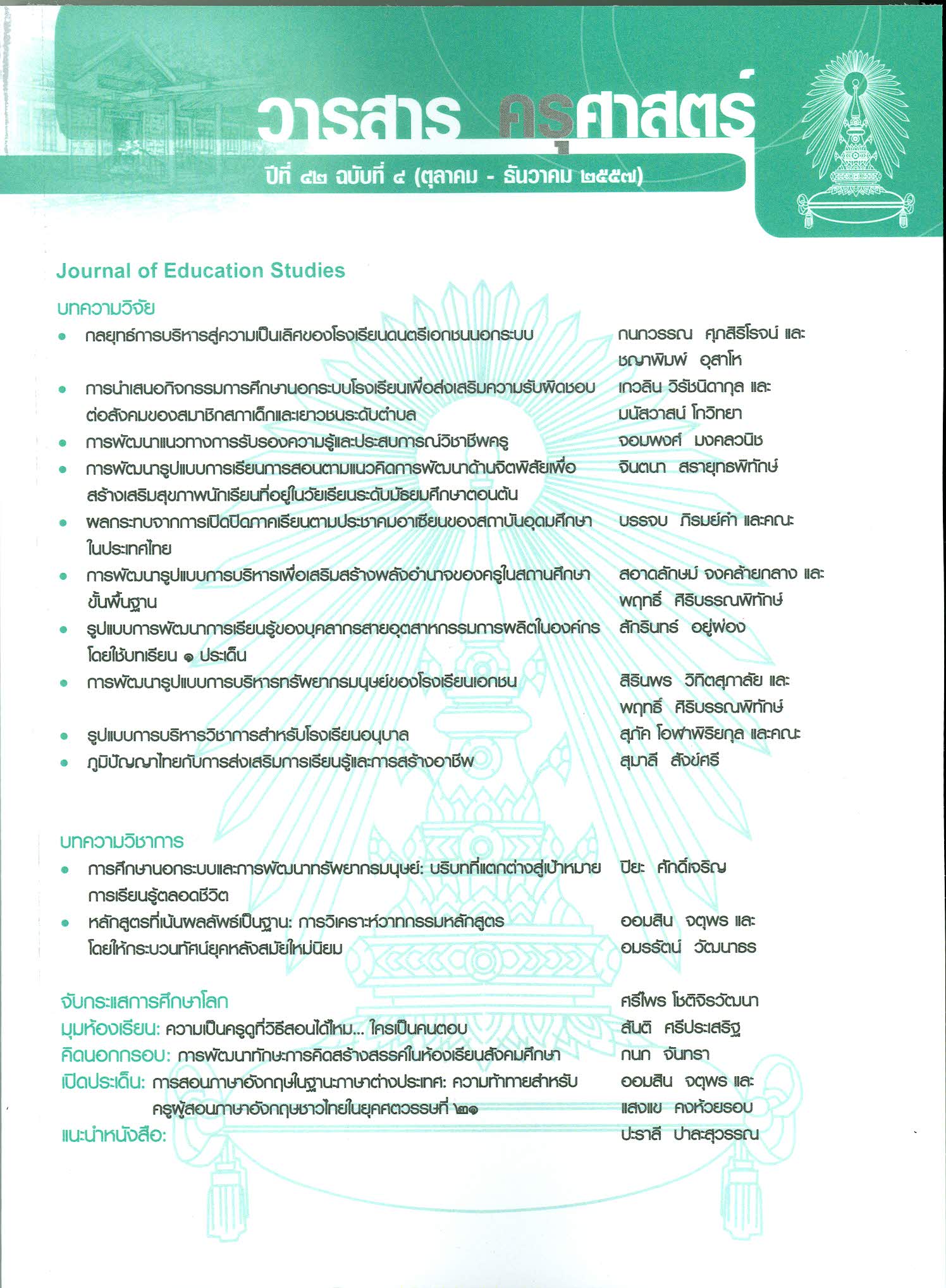ผลกระทบจากการเปิดปิดภาคเรียนตามประชาคมอาเซียนของสถาบันอุดมศึกษาในประเทศไทย EFFECTS FROM BEGINNING AND ENDING OF SEMESTER ACCORDING TO ASEAN COMMUNITY FOR HIGHER EDUCATION INSTITUTES IN THAILAND
Keywords:
ผลกระทบ, อาเซียน, EFFECTS, ASEANAbstract
การวิจัยครั้งนี้มีวัตถุประสงค์เพื่อ 1) ศึกษาการเปิดปิดภาคเรียนในกลุ่มประเทศอาเซียนและในภูมิภาคต่างๆ 2) วิเคราะห์ข้อดี-ข้อเสีย ปัญหา-อุปสรรค และผลกระทบที่อาจเกิดขึ้น และ 3) ศึกษาการเตรียมความพร้อม ความสนใจ และข้อเสนอแนะจากการเปิดปิดภาคเรียนตามประชาคมอาเซียนของสถาบันอุดมศึกษา โดยใช้วิธีการศึกษาเอกสาร การสำรวจความคิดเห็น และการสัมภาษณ์ผู้ที่เกี่ยวข้อง ได้แก่ ผู้บริหาร นักวิชาการ ผู้ปกครอง นักเรียน และผู้ใช้บัณฑิต วิเคราะห์ข้อมูลโดยใช้ค่าความถี่ ค่าร้อยละ และการวิเคราะห์เนื้อหา ผลการวิจัย พบว่า
1) การเปิดภาคเรียนของมหาวิทยาลัยในประเทศกลุ่มทวีปอเมริกาส่วนใหญ่จะเปิดภาคเรียนแรกในเดือนกันยายนและภาคเรียนที่สองกลางเดือนมกราคม ในทวีปยุโรปจะเปิดเรียนแรกช้ากว่าเล็กน้อย ขณะที่ประเทศในทวีปเอเชียและอาเซียนมีความหลากหลายและแตกต่างกัน 2) การเลื่อนเปิดภาคเรียนมีประโยชน์หรือข้อดี ได้แก่ ความเป็นสากลสอดคล้องกับประชาคมอาเซียน การจัดกิจกรรมทางวิชาการ การแลกเปลี่ยนอาจารย์หรือนักศึกษา แต่อาจมีข้อเสียหรือปัญหาอุปสรรค ได้แก่ สภาพอากาศช่วงฤดูร้อนไม่เหมาะสมกับการเรียนการสอน ต้องใช้เครื่องปรับอากาศและเสียค่าไฟฟ้ามากกว่าปกติ รวมทั้งการฝึกงานหรือการฝึกสอนของนิสิตนักศึกษาหลักสูตรครุศาสตรบัณฑิต และการวิจัยทางเกษตร 3) สถาบันอุดมศึกษาส่วนใหญ่ยังไม่มีการเตรียมความพร้อมหรือดำเนินการใดๆ แต่บางสถาบันได้ดำเนินการ เช่น การเลื่อนเวลาการเปิดภาคเรียนให้ช้าลง การประชาสัมพันธ์ให้บุคลากรและนักศึกษาได้ทราบ ข้อเสนอแนะรัฐบาลควรกำหนดเวลาในการเปิดปิดภาคเรียนให้สอดคล้องกันทั้งระบบ และหน่วยงานที่เกี่ยวข้องควรประชาสัมพันธ์ให้กับผู้ปกครองและนักเรียนได้ทราบเพื่อจะได้วางแผนการดำเนินชีวิตให้เกิดประโยชน์มากที่สุด
The purposes of this research were to 1) study the beginning and ending of semester in the ASEAN countries group and in various regions, 2) analyze the advantages-disadvantages, problems-obstructions, and potential effects, and 3) study the readiness preparation, interest, and recommendations from beginning and ending of semester according to the ASEAN community for the Higher Education Institutes in Thailand. The study methodology was carried out by studying the documents, opinions surveys and interviews of the related persons which included administrators, scholars, parents, students, and the graduate users. The data was collected by using the frequency, percentage, and content analysis. The research results revealed as follows:
1) The beginning and ending of semester for the universities in the countries group of America continent mostly began in September for the Semester 1 and January for Semester 2. In Europe continent, the first beginning was a little slower. While in the countries of Asia and ASEAN, the time was varied and different, 2) the postponement of semester beginning had the advantages in terms of the universal in accordance with the ASEAN Community, academic activities, and lecturers or students exchange. However, this might have the disadvantages or problems and obstruction as follows; the weather of summer was not appropriate for teaching and learning, it had to use the air-conditioner and wasted the electricity more than usual, and training courses or coaching of the students studying for the Bachelor of Education curriculum and Agricultural Research. 3) Most of the Higher Education Institutes were still not ready for preparation or any conduction. However, some institutes had already conducted, for example, be slow or postponed the time of semester beginning, publicized the information to the personnel and students. For the recommendations of government sectors included the time of beginning and ending of semester had better to do concordantly in all systems, the related organizations had better to publicize the parents and students to know the information in order to plan their lives for maximum profits.




